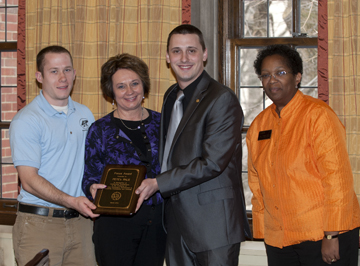PETE's PALS wins Focus Award for community, student engagement

William Robbins (left), Lori Eubank and K. Andrew Richards of PETE's PALS receive the 2012 organization Focus Award from Alysa Rollock, vice president for ethics and compliance. (Purdue University photo/Mark Simons)
Purdue presented four Focus Awards on March 1 for outstanding contributions to furthering the University's commitment to disability accessibility and diversity. Today, Purdue Today is featuring the organization recipient, PETE's PALS.
Every semester, PETE's PALS provides local children with disabilities the opportunity to become efficient movers in a fun and safe environment. Volunteer Purdue student clinicians offer both aquatic and motor skill development activities during the five-week session designed to engage this underserved area of the population both mentally and physically.
The program, which stands for Physical Education Teacher Educators Supporting Physical Activity and Life Skills, was started in 2006 by former faculty member Susan Flynn. After Flynn left Purdue, PETE's PALS remained dormant until K. Andrew Richards, a graduate student in the Department of Health and Kinesiology, incorporated it into his summer session of Health and Kinesiology 326, Foundations of Adapted Physical Education.
"The department asked me to teach the course in the summer of 2010. Although I didn't have a background in adapted physical education, I knew the course served as a vital component of our undergraduate curriculum and I was up for the challenge," Richards says. "The course teaches education pre-service teachers how to work with children with disabilities in a physical activity setting, so field practicum is an important part of the experience."
Since local schools were closed for the summer, Richards reached out to Lori Eubank, a special education teacher in West Lafayette. The two decided to start up a small-scale session of PETE's PALS for the summer course's practicum component. From there, the program took on a life of its own.

Clinician Aubrey Pfeiffer helps a PETE's PAL participant practice a swim kick during a session at the Faith Community Center pool. (Photo provided)
"Our plan was to just do it one time, but after experiencing the program, it was impossible to walk away," Richards says. "The parents were excellent and they begged us to bring the program back. We felt like we had to keep doing it and it was out of our hands at that point. Once you see how much these children love to have relevant and fun physical activity, you want to keep helping them."
Richards and Eubank's continued community outreach through the program earned PETE's PALS the 2012 organization Focus Award.
Every semester, the program holds five weekly sessions at the Faith Community Center in Lafayette. Every week, local children with disabilities are given the opportunity to participate in two one-hour sessions with Purdue student clinicians. One hour is spent in the gym, where the children can interact with their clinicians while developing motor skills, such as throwing, catching and walking. The second hour is spent doing activities in the pool.
The first session of the renewed PETE's PALS program served 15 children and 20 Purdue student clinicians. This spring, the number reached 56 children and 85 clinicians. Richards estimates that the program has served 300 different student clinicians and 200 different children since 2006.
Richards attributes a large part of the program's growth to the expanding roles of student leaders. Two activities directors, undergraduates Wes Wilson and Will Robbins, coordinate physical activity and aquatic programs, respectively. As the activities directors, they write curriculum, coordinate schedules and order equipment. This semester, graduate student Arin Kozlowski joined the leadership team and is providing additional assistance in the pool.
Student clinicians work in groups of seven to nine and interact with the children by supporting and encouraging them to redefine their own limitations. Head clinicians, students who previously participated in the program and showed leadership qualities, supervise each group and provide another level of support.
"Lori and I have done a lot of work to set up the program and work out the logistics, but the true thanks and accolades go to the Purdue students. We can't believe how fortunate we are to have that many people who are willing to donate so much time on a volunteer basis," Richards says. "All we can offer them is free food, a free T-shirt and an opportunity to work with children. Every year we've had enough clinicians to work with the children and it's been a great thing to be a part of."
This program also focuses on building the bridge between Purdue and the community by providing access to the resources that students are able to provide, Richards says.
"PETE's PALS provides a service that fills a sincere gap in the community. As it stands now, there are very few physical activity opportunities for children with disabilities," Richards says. "I think that engagement is a huge component of what we do as a university. We have unparalleled resources and our community can benefit from these resources. PETE's PALS is just one way that we reach out to those individuals that need us the most.
"In the end, that's the essence of the Focus Award and why we've been fortunate enough to win it. We've made a practice of reaching out and touching the lives of the people around us. It's been a massive undertaking, but it's been well worth it."
